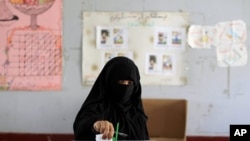Yemenis turned out in large numbers to approve a new president, after a popular uprising led to a regionally brokered peace deal providing for Ali Abdullah Saleh to step down.
The outcome is pre-ordained, but that did not stop people in the capital from flooding polling stations to choose their first new president in nearly 34 years.
Pride in the success of the uprising seemed to counter any resentment that only one name was on the ballot, that of Vice President Abed Rabbo Mansour Hadi.
A worker in Sana'a's old city says the people have already accomplished much.
Sadek, who gave just his first name, said Yemenis expressed themselves before the election by going out and demanding that Ali Abdullah Saleh step down.
Despite the crush of expression again Tuesday, polling places in Sana'a appeared to be handling the crowds.
Monitoring the vote at al Tabari school, local election observer Ali al Kainai said the process was running smoothly.
“It is a good turnout - a lot of people. I see people and they are happy," he said. "They want to take part in this election. Particularly women; I see a big turnout of women and that's good.”
Women played a large role in the uprising, but the country's revolution remains largely unfinished. Hadi will preside over a two-year transition period, and the interim government must deal not only with the political, tribal and military rifts that developed in the past year, but an economic and security collapse.
Attacks on electoral officials marred the run-up to the vote, as separatists in the south and rebels in the far north rejected any continuation of the current leadership. Meanwhile, al Qaida in the Arabian Peninsula has taken advantage of the instability to expand its base. Despite the challenges, political observers say the way President Saleh's era ended is reason to celebrate.
“The fact that he actually left power and left the country relatively peacefully compared to other revolutions that we have seen in the region is a major triumph for the the Yemeni democratic political processes,” noted Stephen Steinbeiser, the resident director of the American Institute for Yemeni Studies.
Yet the long-time leader seems unlikely to fade gently away. Currently in the United States recovering from an assassination attempt, rumors swirl daily he is about to return.
His supporters take comfort that the incoming president represents a continuation of the Saleh years, and say the outgoing leader still has a role to play.
Author Zaafaran Ali, one of Saleh's strongest backers, says the former leader will have a very big role in the coming months. She says he'll be in the background, but “he will return to practice his work."
| Join the conversation on our social journalism site - Middle East Voices. Follow our Middle East reports on Twitter and discuss them on our Facebook page. |




